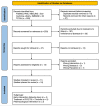Role of the Treatment of Post-Concussion Syndrome in Preventing Long-Term Sequela Like Depression: A Systematic Review of the Randomized Controlled Trials
- PMID: 34722025
- PMCID: PMC8544623
- DOI: 10.7759/cureus.18212
Role of the Treatment of Post-Concussion Syndrome in Preventing Long-Term Sequela Like Depression: A Systematic Review of the Randomized Controlled Trials
Abstract
Traumatic brain injury of any severity can result in post-concussion syndrome (PCS). Although the post-concussive symptoms are complex, there is an emerging scientific consensus regarding the initiation of the treatment for these symptoms to improve quality of life and prevent long-term effects. The objective of this systematic review is to assess the comprehensive interventions used for the PCS and it aims to appraise if these interventions could prevent the development of depression as a complication. This research has used randomized controlled trials (RCTs) that evaluate the treatment of PCS and its effect on long-term complications like depression. We searched PubMed/MEDLINE, PubMed Central, Cochrane Central Register of Controlled Trials (CENTRAL), and EMBASE from January 1, 2016 to May 31, 2021 for our literature search. A quality check was conducted on the identified studies using the Cochrane risk of bias quality assessment tool (modified Cochrane RoB 2). In total, we included 11 RCTs and used Preferred Reporting Items for Systematic Reviews and Meta-Analyses (PRISMA) 2020 guidelines for the reporting of this systematic review. Most of the studies reinforced early initiation of the treatment by providing education to the patients and conducting their risk assessment. Strong evidence for the multidisciplinary treatment consisting of cognitive-behavioral therapy, psychoeducation, and physiotherapy is emphasized by some studies. More studies with a longer follow-up period are required to assess the effectiveness of intervention more accurately on depression. Regardless, this study will discuss guidelines and provide direction to physicians. It will help in developing future guidelines by addressing the clinical gaps in the implementation of these guidelines.
Keywords: chronic post-concussion syndrome; depression; mild traumatic brain injury; post-concussion syndrome; post-concussive symptoms.
Copyright © 2021, Dhandapani et al.
Conflict of interest statement
The authors have declared that no competing interests exist.
Figures
References
-
- Guideline for concussion/mild traumatic brain Injury & prolonged symptoms. [ May; 2021 ];http://braininjuryguidelines.org/concussion/index.php?id=135&tx_onfadult... 2018
-
- Evaluation of a targeted, theory-informed implementation intervention designed to increase uptake of emergency management recommendations regarding adult patients with mild traumatic brain injury: results of the NET cluster randomised trial. Bosch M, McKenzie JE, Ponsford JL, et al. Implement Sci. 2019;14:4. - PMC - PubMed
-
- World Health Organization. The ICD-10 classification of mental and behavioral disorders: clinical descriptions and diagnostic guidelines. [ May; 2021 ];https://apps.who.int/iris/handle/10665/37958 1992
-
- Specialized interdisciplinary rehabilitation reduces persistent post-concussive symptoms: a randomized clinical trial. Rytter HM, Westenbaek K, Henriksen H, Christiansen P, Humle F. Brain Inj. 2019;33:266–281. - PubMed
Publication types
LinkOut - more resources
Full Text Sources

